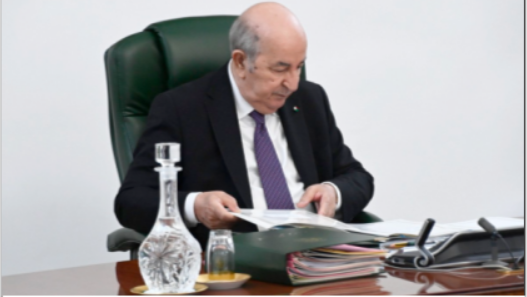Physical Address
Indirizzo: Via Mario Greco 60, Buttigliera Alta, 10090, Torino, Italy
Physical Address
Indirizzo: Via Mario Greco 60, Buttigliera Alta, 10090, Torino, Italy


It was yesterday, Saturday June 8, 2024, that the President of the Republic, Mr. Abdelmadjid Tebboune, signed a presidential decree convening the electorate for the holding of an early presidential election on Saturday September 7, 2024. The press release from press emanating from the Presidency of the Republic, also recalled the legal texts governing early presidential elections, which elections are mainly governed by the Constitution and the ordinance relating to the electoral regime.
Thus and in accordance with articles 85 and 91 of the Constitution, as well as articles 62 and 246 of ordinance 21-01, the President of the Republic can summon the electorate for an early presidential election. Presidential Decree 24-182, signed by President Abdelmadjid
Tebboune, stipulates that the early presidential election will be held on Saturday September 7, 2024. This Decree also sets the dates for the exceptional revision of the electoral lists, from June 12 to 27, 2024. The outgoing President who could stand as a candidate for his own succession , as well as all other personalities, political or not, who meet the conditions set out in the electoral law, now have 40 days from the date of the convocation of the electoral body, to submit their file.
Five candidates are already in the running for this ballot, but these are only announcements, because the said candidates for candidacy will have to have their respective files validated by meeting all the prerequisites specified by law and by overcoming the pitfall of signatures, final test which entitles the candidate to claim a national destiny.
Suspense around President Abdelmadjid Tebboune who has not yet announced his candidacy, although a substantial coalition of political groups has been formed, which supports the outgoing President for a second term, while the President, for his part, who had a blank period at the start of his governance because of Covid-19, is keen to continue his work of building the new Algeria, the contours of which he has outlined in recent years through his commitments. For candidates for candidacy, the test that follows this announcement is tough, because they have one month and ten days to compile an exhaustive file with the Independent National Election Authority – ANIE, where they must prove that they meet to all the moral, administrative and political conditions as stipulated in the electoral law. But the hardest part for the candidates will be to manage to collect 600 signatures of elected officials or those of 50,000 voters, and this in no less than 29 wilayas of the country.
Once the threshold of candidate files has been reached, which it will be up to ANIE to validate or not according to their regulatory compliance, the candidates, now political rivals aligned with a view to a national destiny which is none other than the supreme magistracy , will embark on an electoral campaign, a process of communication and media coverage which has its rules, marked out by very strict provisions from which candidates for the presidential election can carry out their communication campaigns.
The laws provide for defined campaign periods, beginning several weeks before polling day and ending a few days before the election.
Access to the media, for its part, is regulated to guarantee fair and balanced coverage of all candidates. The rules governing this access include airtime equity whereby each candidate must have equal airtime on public television and radio stations; neutrality of public media which means that these media must not favor any candidate at the expense of others; transparency and monitoring which means that ANIE sets up monitoring commissions to ensure compliance with the rules and guarantee fair media coverage for all. These rules aim to ensure that all candidates have an equal opportunity to present their programs to voters, thereby contributing to a transparent and fair electoral process. What follows, after three weeks of electoral campaigns, is a period of electoral silence where, as these terms clearly indicate, no candidate must speak in public in front of voters or communicate to them by any media means whatsoever. . This is to help reestablish an atmosphere of serene neutrality which allows, a few days before the election, Algerian voters to each choose their candidate whose commitments and program they judge to be able to carry out their aspirations.
By Ahmed Rehani